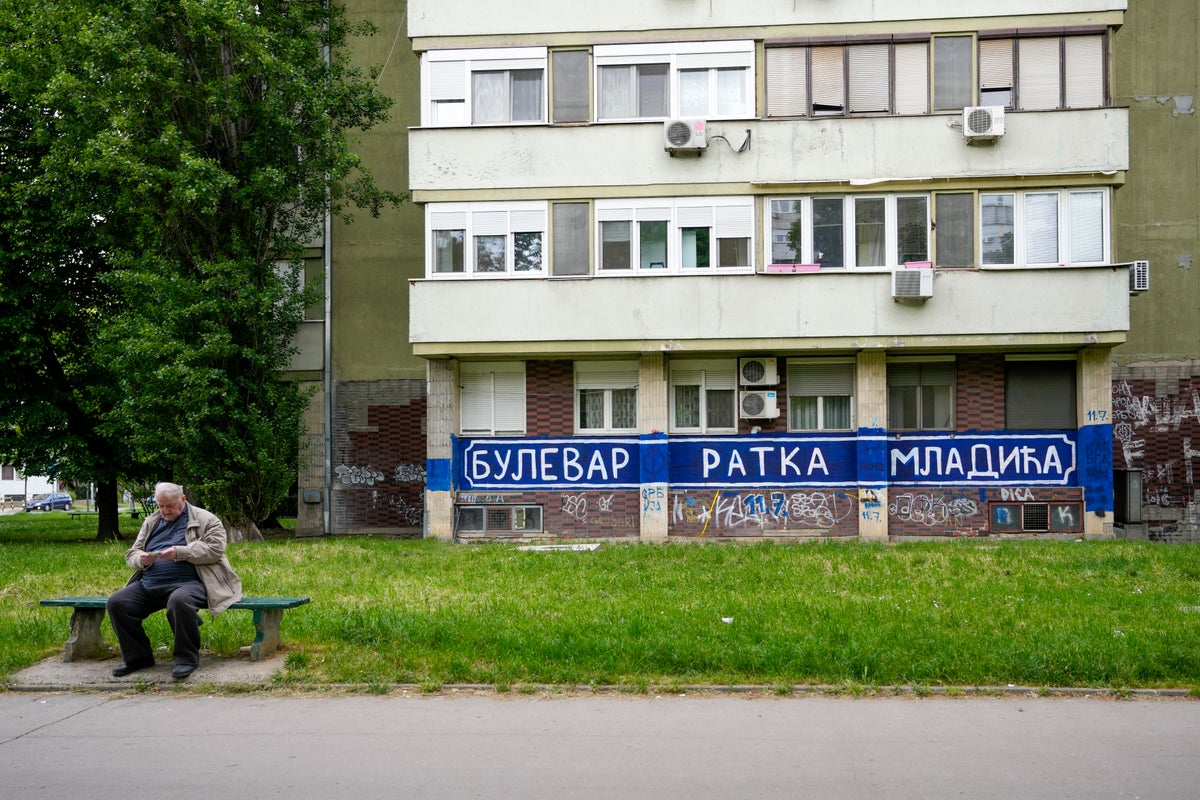
At one end of a long avenue leading through the western districts of Belgrade, there is a large and freshly painted mural that reads: Boulevard of Ratko Mladic.
It’s been there for months or even years, regularly renovated and kept in clean blue and white colors, never vandalized or painted over although thousands of people pass it by every day.
The busy avenue is not officially named after the Bosnian Serb general who was convicted of genocide by an international court for war crimes committed by his troops during the clashes in the Balkans in 1990s, however. It carries the name of Serbia’s first pro-Western prime minister, Zoran Djindjic, who was gunned down by a sniper bullet in front of his government’s offices on March 12, 2003.
This is a country where public lives — and private ones — are intertwined with violence.
When two mass killings in two days last week left 17 dead and 21 injured in Serbia, including eight students killed by a 13-year-old boy, people were shocked, but many were not surprised. Serbia is a country that went through multiple wars in the 1990s, where war criminals are often glorified, where violence is openly displayed in the mainstream state-controlled media and where every second household has at least one gun stacked in a cupboard.
“In Serbia, there has never been a serious debate about the wars and crimes of the '90s,” said prominent historian and university professor Dubravka Stojanovic. "About why those wars happened, how much is whose responsibility, how we managed to go to war four times. ... There is no mention of how we reached the complete dehumanization ... to be so indifferent to all these crimes, without any sympathy for the victims."
Experts say the Balkan nation’s recent history has left a deep mark on the entire society.
Though Serbia is now seeking membership in the European Union, it has never fully come to terms with its role in the conflict in the former Yugoslavia and the war crimes that were committed by Serb troops in Croatia, Bosnia and Kosovo, analysts say.
In the 1990s, Serbia’s nationalist leader, Slobodan Milosevic, was widely blamed for triggering the breakup of Yugoslavia by launching wars to incorporate Serb-populated lands in Bosnia and Croatia into one state.
As the Serb onslaught saw cities besieged and reduced to rubble and non-Serbs killed or driven from their homes, Serbia’s state-run propaganda portrayed the Serbs as the biggest victims of the Yugoslav conflict and U.N. sanctions as an anti-Serb conspiracy — a narrative that still persists in the Serbia of today, which is ruled by autocratic, pro-Russian President Aleksandar Vucic, who was Milosevic's information minister during the 1998-1999 war in Kosovo.
In the '90s, poverty surged, crime and corruption flourished and mafia-style killings flooded the streets. Inflation was world's highest, ordinary people lost their savings and jobs, while crime bosses and soccer hooligans rose to prominence.
Scores of people, including a former president, an ex-defense minister, senior police officers, journalists and politicians, all were killed during those years, and many of the murders still remain unresolved.
The war era culminated in 1999, when NATO launched airstrikes to stop the conflict in Kosovo and force Serbia to end its crackdown on separatist ethnic Albanian rebels. The United States and its allies said they feared Milosevic could repeat a slaughter from 1995 when Bosnian Serb troops killed more than 8,000 Bosniak men and boys in Srebrenica, in a military operation led by Mladic.
The 78-day bombing brought Milosevic to his knees and left Serbia in ruins. A year later, an opposition-led populist uprising ousted Milosevic from power to install Djindjic’s government, the first democratic one in Serbia since World War II. Pro-democracy supporters sighed with relief, but not for long.
In 2003, two years after he orchestrated Milosevic’s extradition to the U.N. war crimes tribunal, Djindjic was gunned down by a special paramilitary unit that used to fight in Bosnia and Croatia. That action paved the way for the fall of his government and the gradual disintegration of Serbia’s fragile democracy.
A decade later, a coalition government of parties that led the wars in the 1990s was again firmly in power. And another decade on, Vucic now rules the country almost single-handedly. While portraying himself as a reformist who will take Serbia into the EU, he controls all means of power and keeps tight control over a mainstream media that promotes hate speech against his critics.
Fed up with Vucic's populist rule, tens of thousands on Monday marched through Belgrade and other Serbian cities in silence to commemorate the victims of the mass killings. It was the biggest anti-government protest in years.
The protest organizers demanded the resignations of government ministers and the withdrawal of broadcast licenses for two state-controlled TV stations that promote violence and often host convicted war criminals and crime figures on their programs.
After the protest officially ended, some of the protesters chanted slogans against Vucic, demanding that he step down. Another rally by opposition supporters is planned for Friday.
Vucic reacted with anger, claiming the opposition wants to topple his government, and called for “the biggest rally in Serbia's history” on May 26, creating a potential for clashes between his and opposition supporters.
“Their only goal is to take over power by force and to lead Serbia into chaos, instability and unrest,” Vucic said, referring to the opposition and its supporters.
But opponents say Vucic has to take responsibility for creating an atmosphere of uncertainty and hopelessness in the country that they say led to the mass killings.
“The weapons used to kill the children had been filled with evil for a decade,” tweeted opposition leader Zdravko Ponos. “We will not be healed even if all the weapons were taken away and all the sociopaths were put behind bars, as long as our destiny is shaped by the one who unlocked and rode that evil.”







